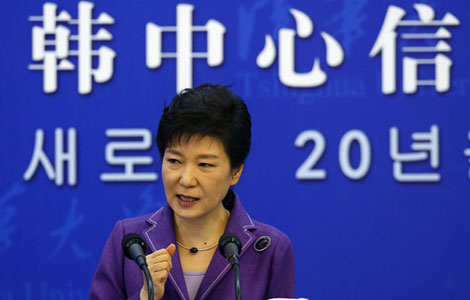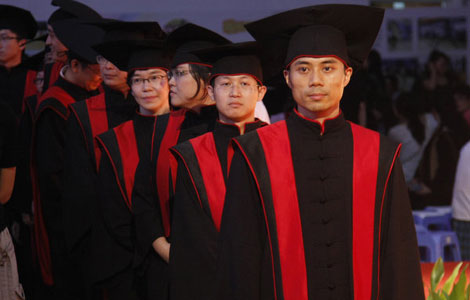
China is unlikely to become the next breaking point and deepen the global financial crisis, scholars and experts agreed at the Third Global Think Tank Summit on Saturday. They are confident that details of reforms to be released in the second half of the year will create more space for the economy to maintain stable growth.
A huge domestic market and a strong drive to improve public infrastructure will create the growth engine that will guide China out of its development dilemma, they also said.
These observations refute some foreign investors' views that China may be the source of the next tsunami after the US property bubble burst, and European debt surged.
In financial crises, most major economies choose to expand the government's debt to stimulate growth, and the same measures are expected to be taken by China.
"According to the development trend, the country that chooses to deviate from the proven path will suffer serious recession," said Li Daokui, a professor at the School of Economic and Management of Tsinghua University, and a former advisor to the People's Bank of China.
Fast-growing debt and an expanding shadow banking system have increased potential financial risks, but the new round of reforms to start in the third quarter is expected to relieve bad loans and draw in private capital into more fixed-asset investments, Li said.
Investments can be increased in areas such as reducing air and water pollution and improving urban underground infrastructure, he said.
"Local governments should start debt restructuring, and seek more reliable and sustainable tax resources," he added.
Justin Yifu Lin, former chief economist and senior vice-president of the World Bank, agreed that the world's second largest economy still has much space to sustain its growth potential.
"As China's labor-incentive industries are changing towards high value-added businesses, other emerging economies will enter a golden time of industrialization based on advantages in their labor markets," Lin said.
China's current debt load is almost twice as much as its GDP, which has Wall Street fearing that the new leaders may rein in credit at the cost of a slowdown in growth.
Some global financial forecasts have downgraded its growth to 7.4 percent in 2013, but Premier Li Keqiang expressed his confidence in achieving this year's GDP target of 7.5 percent on Friday.
The central bank's conservative stance on a prudent monetary policy remains firm, despite a surge in interbank lending rates and a stock market plunge last week.
The PBOC will guide financial institutions towards reasonable credit creation and properly managed credit risks to support economic restructuring, said Qu Hongbin, chief economist in China of the HSBC Holdings.
"Given the still complicated external environment and domestic challenges confronting China's economy, the central bank will likely step up efforts to enhance its policy by being more proactive and flexible," he said.
Emerging markets will have more challenges in the coming months if the evaluation of US fed's qualitative easing policy accelerates, said Renato Baumann, director of the International Division of IPEA, a Brazilian government research institution.
Chenjia1@chinadaily.com.cn







